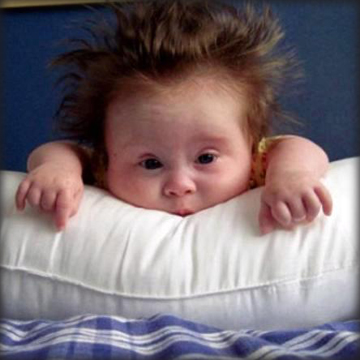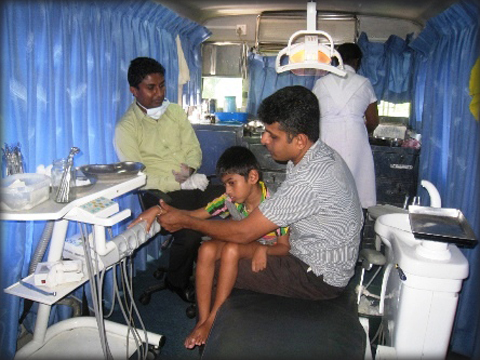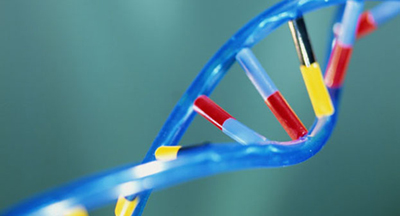|

Down Syndrome Day - March 21 :
Structured programs can promote DS children's skills- Dr Samanmali
Sumanasena
By Carol Aloysius
People with Down Syndrome (DS) are stigmatised and faced with
prejudice by the society that knows very little of their specific
condition. They are more vulnerable to health and physical impairments.
These could influence their daily activities and even shorten their life
span.
DS is usually detected in early childhood even when a child is still
in its mother's womb, and progresses with time. There is no known cure
for it.
Yet, given the skills and opportunities to learn them with sufficient
motivation, these children are no different from other children, says an
eminent paeditrician with a hands on experience in working with children
with disabilities.
Consultant Paediatrician and Senior Lecturer in Disability Studies at
the Faculty of Medicine, University of Kelaniya, Dr SAMANMALI SUMANASENA,
talks to the Sunday Observer on what causes this condition, its impacts
on health and how such children can be empowered with skills by
especially their parents and carers.
Excerpts...
Q. What is Down Syndrome? Is it a neurological condition?
 A. Down Syndrome is chromosomal disorder, where you get an
extra chromosome of the 21st chromosome. A. Down Syndrome is chromosomal disorder, where you get an
extra chromosome of the 21st chromosome.
Q. How does it occur? What is the cause?
A. During the formation of the gamete (the stage of meiosis)
instead of the chromosomes becoming halved (i.e. 23 chromosomes going
into the gamete) and receives an extra chromosome (i.e. 24 in all). This
could happen when forming an ovum or a sperm.
Q. How is this possible?
A. This is due to non separation or stickiness of one pair of
chromosomes. When an abnormal gamete with 24 chromosomes is fertilised
by a normal gamete which has 23 chromosomes, the fertilised egg would
have 47 chromosomes (i.e. an extra chromosome.)
Q. What would be the result of this?
A. The commonest disease condition is Down Syndrome.
Q. Are there certain risk factors that facilitate this
condition?
A. Age of the mother. Studies have shown that the incidence of
DS increases with the increasing age of the mother.
Q. Ideally what should be the age of the mother to have a
normal child?
A. The risk is higher if she is over 35 years and after 40
years the risk is much higher.
Q. Does that mean that children of younger mothers are not at
risk?
A. The chances are rare. But still there are many young
mothers who have children with Down syndrome.
Q. How is DS detected?
A. DS can be detected prenatally and post natally. Prenatally
it can be detected by a blood test and ultra scan done within three
months of pregnancy.
After birth it can be detected by appearance and other signs and
chromosomal analysis.
Q. What is the health impacts of DS on the patient?
A. It causes changes in the brain, affects the heart, kidney,
thyroid, intestines, eyes, growth and development and a child's learning
abilities.
Q. What are the outward symptoms?
A. Children with DS are often short for age. They have
straight but scanty hair. Their eyes are slanted upwards. They tend to
be obese and have sleeping problems later in life.
Q. Can they develop more serious illnesses such as cancer?
A. They can get leukemia because of their chromosome
impediments, and can also get early diabetes due to their genetic
problem.
Q. Can these complications be prevented?
A. They need to have blood tests, eye tests, and thyroid gland
functioning tests regularly.
Q. What are their chances of leading a normal life?
A. The same as other children. If their health is looked after
and monitored carefully, they can lead normal lives but may need some
support at times.
Q. What about their learning abilities?
A. There's no study been done to say they are more or less
gifted than other children or vice versa in Sri Lanka.
From work done in developed countries it is shown that they can
achieve similar skills if trained from early life and supported
adequately. They can learn to read, write, do maths and engage in extra
curricular activities. But on one condition.
Q. What is that?
A. These activities should be started from birth and the
parents and teachers should be committed to a good home based
intervention program.
Q. Does brain development in DS children take the same period
as that of a normal child?
A. Yes. Like all children, brain development takes place best
before they reach their third birthday.
So it is important that in the case of these children like other
children their age, their parents give them plenty of activities that
will stimulate the brain and help them acquire various skills. In the
USA children with DS who cannot read use an exception. But this is not
the case in Sri Lanka, I find.
Q. Why not?
A. In my opinion, it boils down to the negative attitude
society has in general towards our children, which in turn is passed on
to the parents.
Q. Who is to blame for this?
A. I feel it starts with the attending paediatrician, the
gynaecologist and obstetrician who is the mother's fist point of
contact.
If by a blood test or scan they detect changes in the brain while the
child is still in the womb, or after delivery, they must reveal the
truth to the family and prepare them for the birth. When the child is
born parents should be adequately supported and guided for proper
management. Parents should be directed to see the strengths of these
children, not so-called 'weaknesses'.
Q. Examples?
A. I got a frantic call from a young mother recently who said
she had been very distressed after her doctor had informed her that her
child was mentally retarded. How can you detect a child is mentally
retarded if he's only 2-3 weeks old, I ask you? What kind of IQ tests
are possible on such young children to evaluate their level of
intelligence?
This kind of negativity is one of the causes for preventing children
with disabilities from moving forward.
Q. What happens to kids who are considered ‘slow'?
A. In the developed countries if a child is diagnosed as
having a developmental disorder, he/she is referred for early
intervention, he is directed to a centre within the community where
Development Paediatricians and a team of therapists (speech and language
therapists, physiotherapists, occupational therapists) work with such
children and help stimulate their child. This is a huge need in Sri
Lanka.
Q. There are different schools of thought with regard to their
education. Some feel they should be in special schools. Others believe
they should attend normal schools. What do you think?
A. Right now we are seeing efforts to set up special schools
for them. But I feel the better option would be inclusive education in a
mainstream school.
Q. Do you have a National Registry of Down Syndrome children
in Sri Lanka?
A. Not yet. We are working towards this and expect to have
more information on them by the end of this year. Right now the
difficulty is that many parents don’t register them in hospitals and
keep them away from society.
This stigma must be eliminated with more awareness programs for
parents and society.
Q. Your message?
A. Early intervention and early stimulation is the key for
children with Down Syndrome to lead normal lives.
CPLF wheelchair donation camps
Cerebral Palsy Lanka Foundation (CPLF) an organisation for children
with cerebral palsy in Sri Lanka has successfully completed two
wheelchair donation camps in Ambalantota and Anuradhapura.
The free camps will continue to place every Sunday in key locations
across Sri Lanka until April 19, 2015. At each camp, specially designed
wheelchairs will be donated to children suffering from cerebral palsy,
to provide them with greater mobility and a better quality of life.
The Ambalantota camp was held on February 15, 2015 and had 90
participants and 54 wheelchairs were donated at the camp.
The Anuradhapura camp was held on February 22, 2015, and had 60
participants and 25 wheelchair donations were made. Additionally, free
dental screening was conducted by the Sri Lanka Dental Association (SLDA)
at each camp and eye screening tests were done with the assistance of
the Vision 2020 project.
|

Wheelchair services assessment by trained physiotherapist |
Founder/Chairman of the Cerebral Palsy Lanka Foundation Gopi
Kitnasamay said, “It is probably difficult for people who aren’t
differently-abled to comprehend just how important a wheelchair is to
someone who needs to use it on a day-to-day basis.
A wheelchair is so much more than just a piece of equipment; it
enables us to transform lives through the gift of mobility. As a parent
of a child who uses a wheelchair, my family and I truly understand the
important role a wheelchair plays in our child’s life. Without a
wheelchair, we would not be able to take our son to his school, or to a
park or even for a wedding; he would simply remain house bound.
Children suffering from cerebral palsy cannot always move freely, so
we started this project to give these children greater mobility, more
independence and freedom and we also wanted to give them a chance to
actively participate in the community and enjoy a more wholesome and
fulfilling life. At each of these camps, children in need were provided
with a wheelchair, and using it will undoubtedly improve their lives. It
was a heart-warming experience to see the smiles of the children and the
happiness on the faces of their parents.”
The special wheelchair donation camps for children with cerebral
palsy will also provide an opportunity for parents to seek assistance if
they have a child with cerebral palsy or if they suspect that their
child may be affected by the disorder. In an effort to create awareness
about the disorder and provide affected parents and their children with
assistance, the Cerebral Palsy Lanka Foundation will also launch the
National Cerebral Palsy Register.
The register will stand as a database to help identify the most
prevalent causes of cerebral palsy and will identify the districts which
have a higher percentage of children who are affected by the disorder.
The camps will be conducted across Sri Lanka as follows:
Kandy – March 15 2015
Ratnapura –March 22 2015
Kurunegala–March 29 2015
Galle–April 9, 2015
Batticaloa – April 12, 2015
Colombo – April 19, 2015
The Cerebral Palsy Lanka Foundation (CPLF) was started in 2011 with
the objective of providing educational and therapeutic services for
children with cerebral palsy and associated movement disorders.
The CPLF office is located at 7, Captain Kelum Rajapakse Mawatha,
Wattala. For more information log on to the CPLF website at
www.cplank.org/www.cplank.lk
To register your child for a camp or to find out more, kindly SMS or
contact 0777554328 or 0717777355.
Link between autism genes and higher intelligence
Genes linked with a greater risk of developing autism may also be
associated with higher intelligence, a study suggests.
Researchers have found new evidence linking genetic factors
associated with autism to better cognitive ability in people who do not
have the condition. The relationship between autism and intelligence is
not clear, researchers say.
Although up to 70 per cent of individuals with autism have an
intellectual disability, some people with the disorder have relatively
well-preserved, or even higher than average, non-verbal intelligence,
the team says. Autism is a developmental disability that can cause
significant language and speech difficulties.
 Non-verbal intelligence enables people to solve complex problems
using visual and hands-on reasoning skills requiring little or no use of
language. Researchers at the Universities of Edinburgh and Queensland
analysed almost 10,000 people recruited from the general population of
Scotland. Individuals were tested for general cognitive ability and had
their DNA analysed. Non-verbal intelligence enables people to solve complex problems
using visual and hands-on reasoning skills requiring little or no use of
language. Researchers at the Universities of Edinburgh and Queensland
analysed almost 10,000 people recruited from the general population of
Scotland. Individuals were tested for general cognitive ability and had
their DNA analysed.
The team found that even among people who never develop autism,
carrying genetic traits associated with the disorder is, on average,
linked to scoring slightly better on cognitive tests.
Researchers found further evidence of a link between
autism-associated genes and intelligence when they carried out the same
tests on 921 adolescents who were part of the Brisbane Adolescent Twin
Study.
Dr Toni-Kim Clarke, of the University of Edinburgh's Division of
Psychiatry, who led the study, said: “Our findings show that genetic
variation which increases risk for autism is associated with better
cognitive ability in non-autistic individuals.
As we begin to understand how genetic variants associated with autism
impact brain function, we may begin to further understand the nature of
autistic intelligence.” Prof Nick Martin, of the Queensland Institute
for Medical Research, said: “Links between autism and better cognitive
function have been suspected and are widely implied by the well-known
“Silicon Valley syndrome” and films such as “Rain Man” as well as in
popular literature.
- Medicalxpress
Can intensive mindfulness training improve depression?
Depression affects about 350 million people worldwide and is the
leading cause of disability. Mindfulness training is a promising
approach to decreasing depressive symptoms.
The success of an intensive mindfulness meditation program on
reducing depression, and how factors such as age, gender, and
spirituality affect an individual's response to training are presented
in The Journal of Alternative and Complementary Medicine, a
peer-reviewed publication.
Jeffrey Greeson, PhD, and coauthors, compared how individual
differences in religious beliefs, spirituality, the ability to achieve
mindfulness, gender, and age affect levels of depressive symptoms after
completing an 8-week course in Mindfulness-Based Stress Reduction (MBSR).
In the article “Decreased Symptoms of Depression after
Mindfulness-Based Stress Reduction: Potential Moderating Effects of
Religiosity, Spirituality, Trait Mindfulness, Sex, and Age,” the authors
report that overall, depressive symptoms decreased substantially for
nearly all of the subgroups of participants, and they suggest that MBSR
can be helpful whether its use is intended by the individual as a
secular or spiritual practice.
- MNT
|

